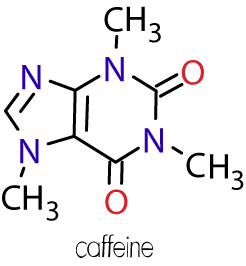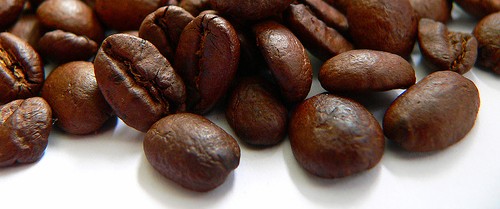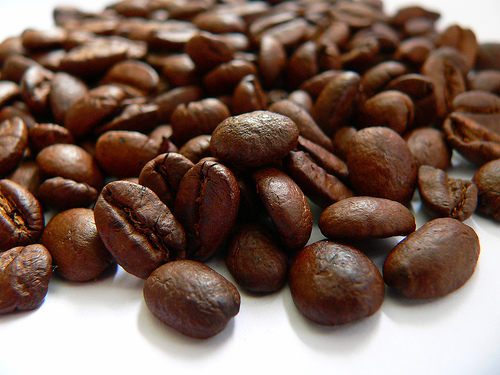Caffeine Decaffeination

Cas No. [58-08-2]
Extraction of caffeine from coffee, to produce decaffeinated coffee
and caffeine, is an important industrial process and can be
performed using a number of different solvents. Benzene, chloroform,
trichloroethylene and dichloromethane have all been used over the
years but for reasons of safety, environmental impact, cost and
flavor, they have been superseded by the following main methods:
Water extraction
Coffee beans are soaked in water. The water, which contains many
other compounds in addition to caffeine and contributes to the
flavor of coffee, is then passed through activated charcoal, which
removes the ca ffeine. The water can then be put back with the beans
and evaporated dry, leaving decaffeinated coffee with a good flavor.
Coffee manufacturers recover the caffeine and resell it for use in
soft drinks and over-the-counter caffeine tablets. ffeine. The water can then be put back with the beans
and evaporated dry, leaving decaffeinated coffee with a good flavor.
Coffee manufacturers recover the caffeine and resell it for use in
soft drinks and over-the-counter caffeine tablets.
Supercritical carbon dioxide extraction
Supercritical carbon dioxide is an excellent nonpolar solvent for
caffeine, and is safer than the organic solvents that are otherwise
used. The extraction process is simple: CO2 is forced through the
green coffee beans at temperatures above 31.1 °C and pressures above
73 atm. Under these conditions, CO2 is in a "supercritical" state:
it has gaslike properties which allow it to penetrate deep into the
beans but also liquid-like properties which dissolve 97–99% of the
caffeine. The caffeine-laden CO2 is then sprayed with high pressure
water to remove the caffeine. The caffeine can then be isolated by
charcoal adsorption (as above) or by distillation, recrystallization,
or reverse osmosis.
Extraction by organic solvents
Organic solvents such as ethyl acetate present much less health and
environmental hazard than previously used chlorinated and aromatic
solvents. Another method is to use triglyceride oils obtained from
spent coffee grounds.
What Is Caffeine?
Caffeine is a drug that is naturally produced in the leaves and
seeds of many plants. It's also produced artificially and added to
certain foods. Caffeine is defined as a drug because it stimulates
the central nervous system, causing increased alertness. Caffeine
gives most people a temporary energy boost and elevates mood.
Caffeine is in tea, coffee, chocolate, many soft drinks, and pain
relievers and other over-the-counter medications. In its natural
form, caffeine tastes very bitter. But most caffeinated drinks have
gone through enough processing to camouflage the bitter taste.
Teens usually get most of their caffeine from soft drinks and energy
drinks. (In addition to caffeine, these also can have added sugar
and artificial flavors.) Caffeine is not stored in the body, but you
may feel its effects for up to 6 hours.
Got the Jitters?
Many people feel that caffeine increases their mental alertness.
Higher doses of caffeine can cause anxiety, dizziness, headaches,
and the jitters. Caffeine can also interfere with normal sleep.
Caffeine sensitivity (the amount of caffeine that will produce an
effect in someone) varies from person to person. On average, the
smaller the person, the less caffeine needed to produce side
effects. Caffeine sensitivity is most affected by the amount of
caffeine a person has daily. People who regularly take in a lot of
caffeine soon develop less sensitivity to it. This means they may
need more caffeine to achieve the same effects.
Caffeine is a diuretic, meaning it causes a person to urinate (pee)
more. It's not clear whether this causes dehydration or not. To be
safe, it's probably a good idea to stay away from too much caffeine
in hot weather, during long workouts, or in other situations where
you might sweat a lot.
Caffeine may also cause the body to lose calcium, and that can lead
to bone loss over time. Drinking caffeine-containing soft drinks and
coffee instead of milk can have an even greater impact on bone
density and the risk of developing osteoporosisosteoporosis.
Caffeine can aggravate certain heart problems. It may also interact
with some medications or supplements. If you are stressed or
anxious, caffeine can make these feelings worse. Although caffeine
is sometimes used to treat migraine headaches, it can make headaches
worse for some people.
Moderation Is the Key
Caffeine is usually thought to be safe in moderate amounts. Experts
consider 200–300 mg of caffeine a day to be a moderate amount for
adults. But consuming as little as 100 mg of caffeine a day can lead
a person to become "dependent" on caffeine. This means that someone
may develop withdrawal symptoms (like tiredness, irritability, and
headaches) if he or she quits caffeine suddenly.

>>
New Product
Introduced :
Oseltamivir
Phosphate,
Phenyl Propanolamine,
Phenylephrine,
Etafedrine

|

 We all know that one of the most
powerful chemical compounds found in both coffee and tea is
caffeine. Has caffeine become an important part of your daily life?
Did you know We all know that one of the most
powerful chemical compounds found in both coffee and tea is
caffeine. Has caffeine become an important part of your daily life?
Did you know
Article : What Is Caffeine?
 Caffeine is a drug that is naturally
produced in the leaves and seeds of many plants. It's also produced
artificially and added to certain foods. Caffeine is defined as a
drug because it stimulates the central nervous system, causing
increased alertness. Caffeine gives most people a temporary energy
boost and elevates mood. Caffeine is a drug that is naturally
produced in the leaves and seeds of many plants. It's also produced
artificially and added to certain foods. Caffeine is defined as a
drug because it stimulates the central nervous system, causing
increased alertness. Caffeine gives most people a temporary energy
boost and elevates mood.
Caffeine is in tea, coffee, chocolate, many soft drinks, and pain
relievers and other over-the-counter medications. In its natural
form, caffeine tastes very bitter. But most caffeinated drinks have
gone through enough processing to camouflage the bitter taste.
Teens usually get most of their caffeine from soft drinks and energy
drinks. (In addition to caffeine, these also can have added sugar
and artificial flavors.) Caffeine is not stored in the body, but you
may feel its effects for up to 6 hours.
![Caffeine Cas No. [58-08-2]](caffeine/CAFFEINE%20LOGO%20SMALL.bmp)
|


